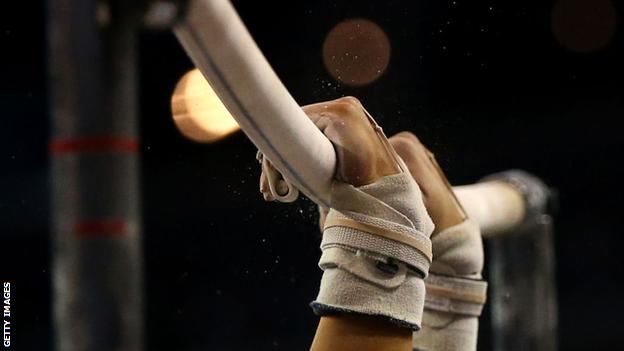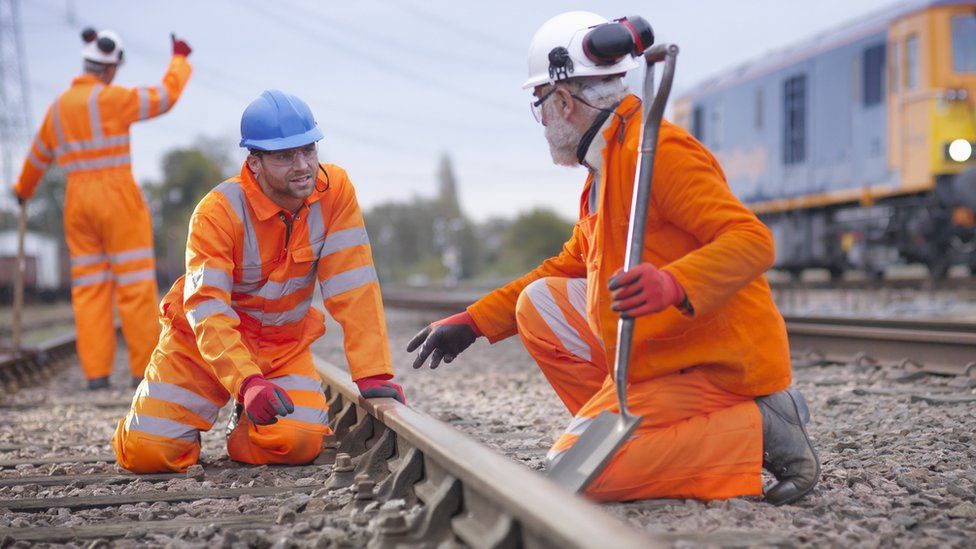
Warning: This article contains some description of graphic injuries and abuse.
Issues of physical and emotional abuse within gymnastics in Britain were "systemic", an independent investigation has found.
The Whyte Review, co-commissioned by UK Sport and Sport England, was released on Thursday and found gymnast wellbeing and welfare "has not been at the centre of British Gymnastics' culture".
Athletes were made to train on injuries, punished for needing the toilet, sat on by coaches, shouted and sworn at and had their bags searched for food.
The review said the difficulties now facing British Gymnastics, the sport's national governing body, are "borne of inadequate practice and procedure", and reflect a culture which was the product of "the way in which people behaved and were allowed to behave".
There was a sense, it added, that British Gymnastics had "not only failed to prevent or limit such behaviours but had condoned some of them in the pursuit of national and international competitive success".
The former chief executive of British Gymnastics, Jane Allen, who retired in December 2020, was criticised in the report for a "lack of leadership" and an "organisational failure to appreciate the central importance of athlete welfare".
In a statement, she said she was "deeply sorry I didn't do more for everyone - especially the athletes - to feel supported, able to speak up and heard".

The Whyte Review was commissioned in 2020 following allegations of abuse and mistreatment within gymnastics in Britain.
UK Sport and Sport England said they "welcomed" the report and "accepted and endorsed" its recommendations - adding gymnastics' continued funding will "depend on its new leadership teams making significant changes to the sport" in the timeline set out in the Whyte Review.
British Gymnastics said it wanted to "wholeheartedly apologise" to gymnasts who had suffered and that it would "not shy away from doing what is needed".
In addition to her 17 recommendations, Anne Whyte QC said a sports ombudsman would be "an obvious step in the right direction".
She also stipulated that the British Gymnastics board publish details of its progress in complying with her recommendations at six, 12 and 24-month intervals, with the expectation that "most if not all of them" are implemented within two years.
In the report, Whyte said: "I hope that the findings in this report will allow the gymnast community to feel that the failures of the past have been publicly recognised and enable the sport to move forward and make positive changes."
She added: "I am confident that the sport of gymnastics is already undergoing change for the good."
What did the review find?
The review, which focused on the period from August 2008 to August 2020, received more than 400 submissions, including 133 from current and former gymnasts, and conducted 190 interviews.
Of those 400-plus submissions:
- More than 40% described physically abusive behaviour towards gymnasts by coaches, including physical chastisement, inappropriate training on injury, overstretching to the point of distress and withholding food, water and access to the toilet.
- More than 50% reported an element of emotional abuse by coaches, such as swearing, name calling, use of belittling language and gaslighting.
- Some 30 submissions included allegations of sexual abuse, such as sexual assault, sexual remarks, inappropriate touching and kissing as a punishment.
- More than 25% included reference to excessive weight management.
The review states the "vast majority" of reports about physically and emotionally abusive behaviour related to female gymnasts, and such behaviour was more prevalent at the elite end of the sport.
On weight management, it said "the tyranny of the scales was coach-led and quite unnecessary".
No individual coaches were named in the report, in which Whyte said the scale of emotional abuse was "far larger than British Gymnastics had appreciated".
During the 12-year period covered by the review - during which British Gymnastics received more than £38m in UK Sport funding - the governing body received approximately 3,800 complaints.
The review also pointed to the recruitment of coaches from, or from countries influenced by, the former Soviet Union, whose "technical skill and experience was sometimes accompanied by an attitude to the gymnast which was autocratic and dismissive and left athletes feeling like commodities".
What were some of the examples given of abuse?
Anecdotes from submissions include:
- One former elite gymnast described being made to stand on the beam for two hours because she was frightened to attempt a skill. Some gymnasts were strapped to bars for extended periods of time while others were made to climb the rope because they needed the toilet or exceeded a break time.
- One gymnast was deliberately dropped from equipment and dragged across the gym floor by their arms, while others were pressured to train on injuries, including broken bones.
- One gymnast recalls at the age of seven being sat on by a coach, while a parent reported two coaches at once pushing their child's legs down into a split. An international competitor recalled their coach sitting on a gymnast's back, forcing their hips into the floor and then lifting up their knee.
- Verbal comments made to gymnasts included that they were "a waste of space", "a joke" and "pathetic" - while in relation to excessive weight management, comments included "you look like a whale", "you look like you have a beer belly", and "your thighs are disgusting".
- Some coaches went to damaging length to control what gymnasts ate and weighed. Gymnasts had their weights publicly announced, were told to send photographs to prove they had lost weight, and had their lunch packs and bags searched for food. Gymnasts would hide food, including in ceiling tiles, and were told "not to eat grapes" because "they are the highest-fat fruit".
- As a result, a "significant" number of gymnasts developed dysfunctional relationships with food, weight and body image, and reports of purging were not uncommon in the submissions.
Whyte said the "unacceptable culture" described in the report "will not be fully eradicated until the national and international leadership within the sport publicly recognise its existence".
What are the recommendations?
Recommendations to British Gymnastics focus on four key areas: safeguarding and welfare, complaints handling, standards and educations, and governance and oversight.
The recommendations include:
- All club owners and managers should have mandatory safeguarding training, and high-performance gymnasts should have access to an independent disclosure service and dedicated welfare officer outside their club.
- British Gymnastics must have a fit-for-purpose case management system that covers number and nature of complaints, and must ensure all welfare-related complaints about employed coaches are independently investigated.
- The organisation should appoint a director of education and increase its direct contact with registered clubs.
- British Gymnastics must appoint independent board members with relevant expertise.
What have the governing bodies said?
A joint statement from UK Sport and Sport England said: "The gymnasts' experiences shared in this review are harrowing and distressing to read. No-one in sport should ever be subjected to such abuse.
"We want to publicly acknowledge and thank all of those who were courageous in coming forward. Your voices are heard. You have played a vital part in fundamentally shaping the future of gymnastics in Britain, to help make it safe and inclusive for future generations to come.
"Duty of care to athletes and participants is the responsibility of national governing bodies. British Gymnastics clearly fell short of this.
"At this time, our intention is to continue to fund British Gymnastics, as we believe that withdrawing funding would not only prevent them from implementing the vital changes outlined in the report but also negatively impact on the support to and wellbeing of gymnasts now.
"However, we are clear that continued funding for British Gymnastics will depend on its new leadership team making significant changes to the sport, to the timelines set out in the report's recommendations."
British Gymnastics' chief executive Sarah Powell, who has been in the post since October, said gymnasts' experiences as detailed in the review were "not acceptable" and she found the report "emotional" reading.
She said it was a "watershed moment" for not just gymnastics, but safeguarding across all sports.
"Gymnastics will be different because of the bravery of the gymnasts who stood up," she said.
In a statement, she said: "British Gymnastics accepts all of the recommendations and key findings. We will not shy away from doing what is needed.
"I want to wholeheartedly apologise to the gymnasts who have suffered as a result of us not working to the standards we set ourselves. We are sorry."
She added: "Let me be clear; there is no place for abuse of any kind in our sport and coaching standards of the past will not be those of the future.
"We will build a new culture and ensure the gymnast's voice is at the heart of all we do. We will change gymnastics for the better."
Why was the review commissioned?
UK Sport and Sport England commissioned the independent review - led by Anne Whyte QC - in July 2020 after allegations of mistreatment in gymnastics. The review formally began the following month.
The review assessed whether:
- Gymnasts' wellbeing and welfare is (and has been) at the centre of the culture of British Gymnastics, its registered clubs and member coaches and if not, why not.
- Safeguarding concerns and complaints have been dealt with appropriately in the sport of gymnastics and if not, why not.
- Gymnasts, or their parents, carers or guardians, have felt unable to raise complaints with appropriate authorities and if so, why.
The review also investigated the "nature and volume of complaints received by British Gymnastics", the governing body's approach to resolving the complaints, and its culture and practices.
How did we get here?
The Whyte Review report did not mention individual coaches or athletes.
- July 2020: Nicole Pavier is among a number of gymnasts to make the first allegations of a "culture of fear" within the "mentally and emotionally abusive" sport of gymnastics.
- Olympians Becky and Ellie Downie say abusive behaviour in gymnastics training became "ingrained" and "completely normalised", while then-British Gymnastics chief executive Jane Allen says she is "appalled and ashamed" by the allegations.
- Olympic bronze medallist Amy Tinkler criticises British Gymnastics for the time it has taken to investigate a formal complaint she made in 2019.
- A helpline is launched by the NSPCC and British Athletes Commission to support gymnasts. It receives more than 120 calls in its first five weeks.
- August 2020: The Whyte Review is formally started.
- Pavier's former coach, Claire Barbieri, is suspended, while British Gymnastics' head national coach Amanda Reddin steps aside after allegations are made against her. Both denied the allegations made against them.
- Olympic bronze medallist Nile Wilson alleges gymnasts are "treated like pieces of meat".
- September 2020: Two further coaches - Helen Potter and Rory Weavers - are temporarily suspended pending investigation. Both denied the allegations made against them.
- October 2020: British Gymnastics chief executive Allen announces she will retire in December.
- November 2020: British Gymnastics sets up an independent complaints process to oversee allegations of mistreatment by athletes.
- February 2021: A group of 17 start legal action against British Gymnastics. A further 20 later join the group claim.
- June 2021: Sarah Powell is named British Gymnastics chief executive, and says she is "under no illusions about the scale of change needed" to improve the culture at the organisation.
- August 2021: British Gymnastics chairman Mike Darcey apologises to the gymnastics community for failing to act on allegations of mistreatment.
- April 2022: BBC Sport reveals leading coach Liz Kincaid was pulled from Great Britain's coaching squad just weeks before the Tokyo Olympics after a serious allegation was made against her. She denied wrongdoing.
- May 2022: National head coach Reddin steps down from her position with immediate effect. Previous claims against her were not upheld and her suspension was lifted, but another independent investigation is ongoing into "further historical complaints".
- June 2022: BBC Sport reveals ex-acrobatic gymnast Eloise Jotischky is the first to win a civil case against British Gymnastics for the abuse she experienced in the sport, with the organisation admitting full liability.
- The Whyte Review is published.
If you have been affected by issues raised in this article, there is information and support available on BBC Action Line.
https://news.google.com/__i/rss/rd/articles/CBMiL2h0dHBzOi8vd3d3LmJiYy5jby51ay9zcG9ydC9neW1uYXN0aWNzLzYxNzk2MTI50gExaHR0cHM6Ly93d3cuYmJjLmNvbS9zcG9ydC9neW1uYXN0aWNzLzYxNzk2MTI5LmFtcA?oc=5
2022-06-16 15:00:04Z
1467627214









